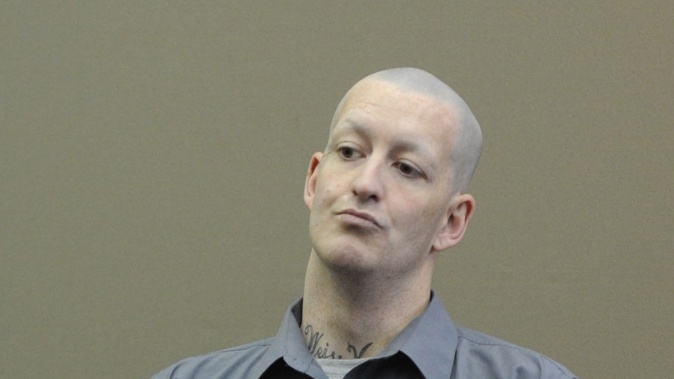
Murderer Peter Holmes has recalled that when he grabbed a wheel brace and beat a man to death he had been full of “righteous anger” after hearing the victim had allegedly abused a woman.
“I took an accusation that was presented to me and took it upon myself to act and in doing that effectively cost a man his life,” Holmes told the New Zealand Parole Board this morning.
“I tried effectively to be the hero …”
Holmes is currently serving life in prison for murder after beating Jamie Ellis to death with a wheel brace in April 2011.
During a party in Oamaru, a female friend of Holmes alleged that Ellis had abused her, though there was no evidence this had occurred.
Holmes, together with father and son duo Dean and Mark Carruthers, then enticed Ellis to leave the party with them and go for a drive.
The four men took two cars and drove roughly an hour south to Warrington, just north of Dunedin.
Then without any warning or provocation, both Mark and Dean Carruthers and Holmes began kicking and punching Ellis and smashing beer bottles over his head.
While the father and son stopped at some point during the beating, Holmes continued, with the use of the tool. Ellis was beaten to death.
His body was then dumped in the bay and found on sand the following morning.
Holmes burned his clothes but told his flatmates how he’d killed Ellis, who was later found to have 62 external wounds to his body.
The Carruthers were initially charged with murder but 18-year-old Mark later pleaded guilty to a reduced charge of manslaughter and received a two-year jail sentence. Dean pleaded guilty to reduced charges of being an accessory after the fact of assault and wounding with intent to cause grievous bodily harm. He received seven months of home detention.
Holmes was recognised as the lead attacker and pleaded guilty to a charge of murder. He was sentenced by Justice Ronald Young in the High Court at Dunedin to life imprisonment with a minimum non-parole period of 12 years and six months.
Justice Young noted that Holmes had taken the law into his own hands after believing Ellis had done something wrong.
Today, at his second attempt at parole, Holmes told the board he had been full of “righteous anger” and believed at the time that it was justified.
“It was something that I was doing the wrong thing for the right reason. It felt as if I was entitled to punish the person. I know I had no right to do what I did,” he told the board.
“I planned to confront him and assault him, and that was as far as I intended it to go. The use of the weapon was what took it too far.”
Holmes looks different than the shaven-headed, smirking man who appeared in court in 2012. These days he wears glasses, is softly spoken and asked to open the hearing with a karakia.
In response to questions from the board about his biggest risk outside of prison, Holmes said connecting with old acquaintances.
“I think the most likely thing would be having associations with old peers. People I used to find comfort and acceptance with. I found those people at that time quite influential and spent a lot of time trying to impress and be accepted by those people,” he said.
“I’d rather set a good example for my son rather than try and impress someone who is going to take me back to jail.”
Holmes, who has more than 100 convictions, mostly for dishonesty, told the board he was a changed man and that his offending had been driven by a desire to please people, and was exacerbated by substance abuse.
But the board said any changes Holmes had made were relatively new compared to his lifetime of offending.
In declining to grant him parole, it said it wanted to see him tested in new environments and recommended he complete release-to-work programs, which would see him outside the wire for short periods.
Holmes will next appear before the board in July 2025.
Take your Radio, Podcasts and Music with you









